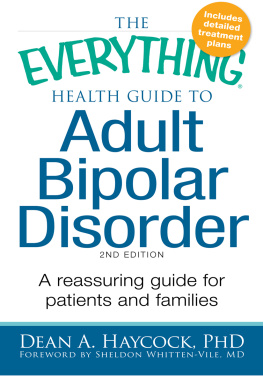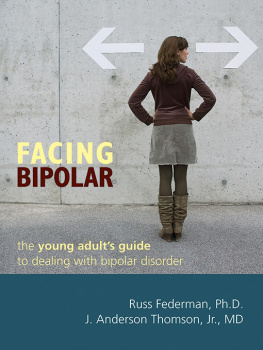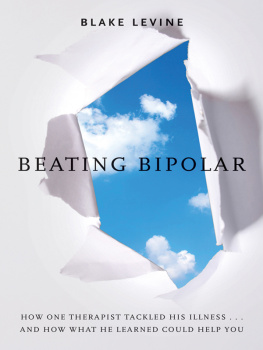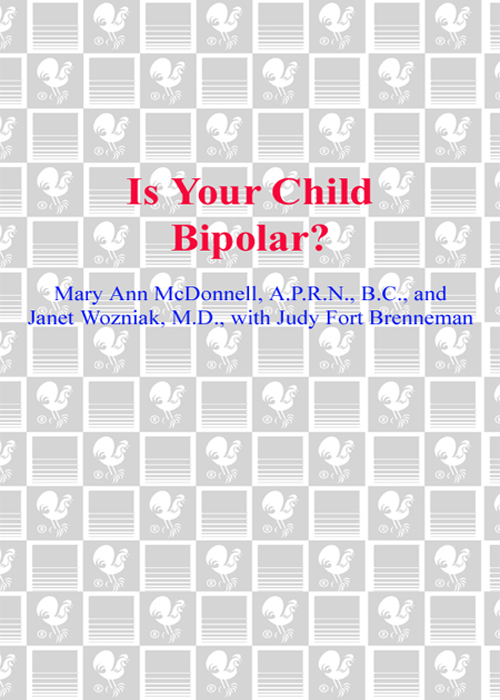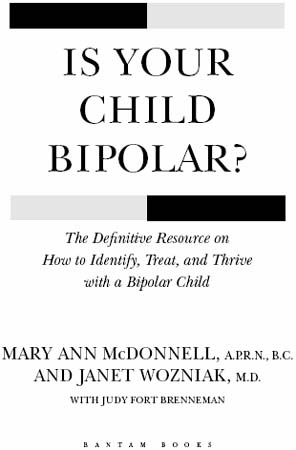Mary Ann McDonnell - Positive Parenting for Bipolar Kids: How to Identify, Treat, Manage, and Rise to the Challenge
Here you can read online Mary Ann McDonnell - Positive Parenting for Bipolar Kids: How to Identify, Treat, Manage, and Rise to the Challenge full text of the book (entire story) in english for free. Download pdf and epub, get meaning, cover and reviews about this ebook. year: 2008, publisher: Random House Publishing Group, genre: Home and family. Description of the work, (preface) as well as reviews are available. Best literature library LitArk.com created for fans of good reading and offers a wide selection of genres:
Romance novel
Science fiction
Adventure
Detective
Science
History
Home and family
Prose
Art
Politics
Computer
Non-fiction
Religion
Business
Children
Humor
Choose a favorite category and find really read worthwhile books. Enjoy immersion in the world of imagination, feel the emotions of the characters or learn something new for yourself, make an fascinating discovery.

- Book:Positive Parenting for Bipolar Kids: How to Identify, Treat, Manage, and Rise to the Challenge
- Author:
- Publisher:Random House Publishing Group
- Genre:
- Year:2008
- Rating:5 / 5
- Favourites:Add to favourites
- Your mark:
Positive Parenting for Bipolar Kids: How to Identify, Treat, Manage, and Rise to the Challenge: summary, description and annotation
We offer to read an annotation, description, summary or preface (depends on what the author of the book "Positive Parenting for Bipolar Kids: How to Identify, Treat, Manage, and Rise to the Challenge" wrote himself). If you haven't found the necessary information about the book — write in the comments, we will try to find it.
More than three million American children suffer from some form of bipolar disorder, a life-impairing illness that can cause wild mood swings and even episodes of rage. But as a parent, can you tell the difference between a tempermental, moody child and one facing serious mental illness? Where do you turn if your childs tantrums and meltdowns are wreaking havoc? For families as well as professionals, here is the only book on early- onset bipolar disorder written by pediatric specialists who combine clinical care and research.
Health experts once thought bipolar disorder, also known as manic depression, did not exist in children and teens. However, leading experts like Janet Wozniak and Mary Ann McDonnell have shown that the illness may appear even before age six, with many cases either undiagnosed or misdiagnosed as Attention Deficit Hyperactivity Disorder (ADHD). Now, in the most complete and authoritative guide yet, Janet Wozniak, M.D., and psychiatric nurse Mary Ann McDonnell offer their unmatched expertise along with the latest information on this difficult condition.
Drawing from their professional experience and sharing stories of families in their practices, the authors guide you in how to:
Navigate the diagnosis tangle to ensure accurate identification of the disorder
Communicate effectively with doctors, teachers, and counselors
Find allies and choose a treatment team
Help your family cope
In a rapidly changing field, The Bipolar Disorder clearly explains what researchers know, what they suspect, and where studies now point. From medication to coping strategies, this accessible book offers inspiration, encouragement, and invaluable wisdom for all involved.
Mary Ann McDonnell: author's other books
Who wrote Positive Parenting for Bipolar Kids: How to Identify, Treat, Manage, and Rise to the Challenge? Find out the surname, the name of the author of the book and a list of all author's works by series.


